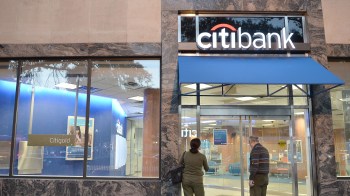What’s a bad loan go for these days?
TEXT OF STORY
KAI RYSSDAL: It’s a stretch to try to define what’s kept the credit markets seized up for the better part of a year in just one sentence, but it’s honestly not that far from the truth. If nobody can figure out what the other guy’s debt is worth, why in the world would they buy any of it? And if they don’t buy, the next person doesn’t buy, and so it goes. The news reports today about Citigroup are unconfirmed, but the buzz is that it’s close to selling $12 billion in loans it desperately wants to get off its books. The bad news for Citigroup is that the bank is said to be selling for a sizable loss. The good news for the rest of us is that it’s another sign of a thaw in the frozen credit markets. Here’s our senior business correspondent Bob Moon.
BOB MOON: Before now, no one’s been sure exactly what this troubled corporate debt is worth, but these investments have never really been a total loss for the banks that hold the IOUs as assets. Investment manager William Smith believes many investors have taken a dire outlook that goes too far.
WILLIAM SMITH: Right now, there’s the armageddon scenario within the financial sector that we just don’t see playing out.
Federal accounting rules have forced banks to write down big losses on paper for these hard-to-sell assets, loans made to big takeover firms to fund leveraged buyouts. Now, a trio of private equity firms reportedly agrees they’re worth just under 90 cents on the dollar, considerably more than the value the banks have been declaring.
SMITH: They need to get it off the books, so they’re willing to take a 10 percent haircut, which is actually better than what they’re showing on the books right now, which is a 20 percent haircut.
Much like a homebuyer waiting out a seller, big investors have been holding out for the best price, and CreditSights analyst Chris Taggert says the pool of capital has been growing.
CHRIS TAGGERT: What we haven’t seen is, we haven’t seen it flow into the market yet in any meaningful size, and this would be the first example of a large pool of capital moving into the market to take advantage of the low prices.
Some analysts are hopeful this is the first step toward the rest of the credit market thawing out, but Douglas McIntyre, a market commentator for the Web site “24/7 Wall St.,” is skeptical mortgage-backed securities will fare as well.
DOUGLAS MCINTYRE: All the other assets that Citi holds, that Lehman holds, there isn’t any evidence that those are bottoming.
In fact, he says there are fresh predictions of even deeper write-downs.
I’m Bob Moon for Marketplace.
There’s a lot happening in the world. Through it all, Marketplace is here for you.
You rely on Marketplace to break down the world’s events and tell you how it affects you in a fact-based, approachable way. We rely on your financial support to keep making that possible.
Your donation today powers the independent journalism that you rely on. For just $5/month, you can help sustain Marketplace so we can keep reporting on the things that matter to you.


















